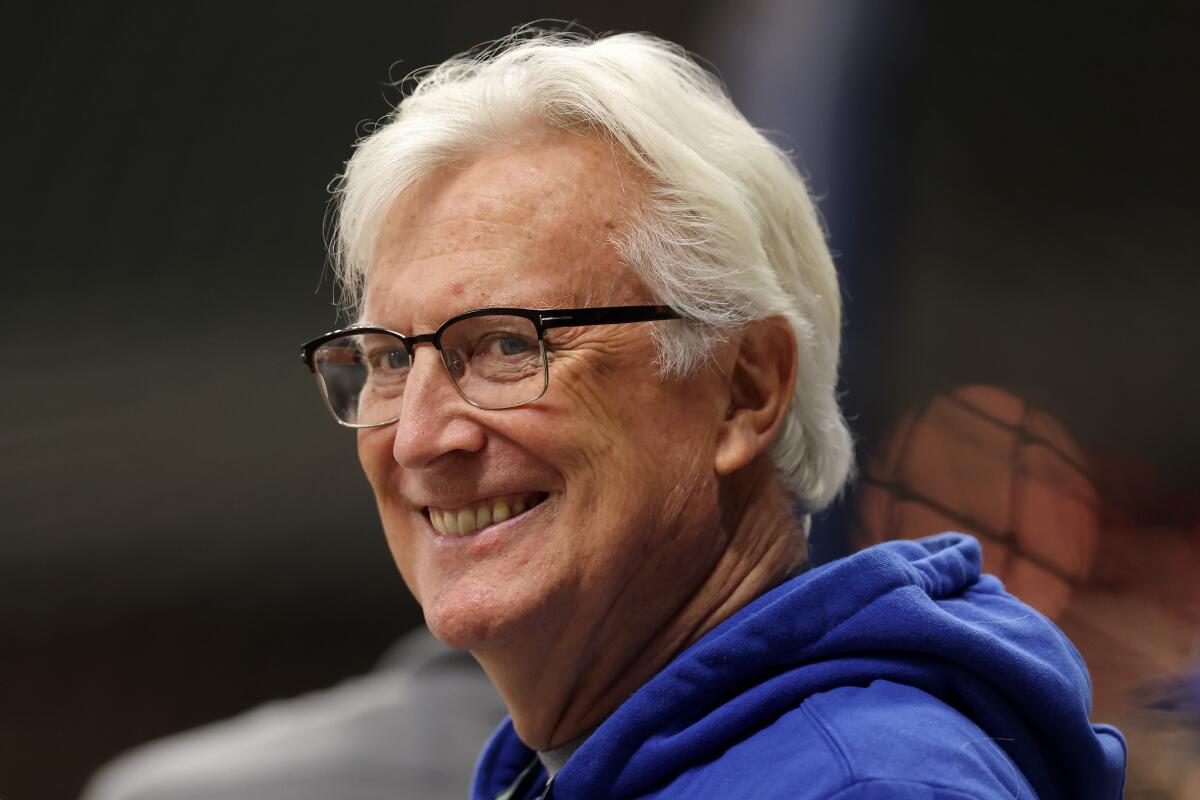How Marcus Smart grades the Lakers’ early season hustle
Welcome back to the Lakers newsletter, where we’re likely standing at an airport as you read this.
The NBA schedule is in full swing. The chaos JJ Redick mentioned at the beginning of the season has arrived. The Lakers played a game with seven standard contract players. Austin Reaves went on a heater for the ages, scoring 51 points in a game, 41 in the next, then hitting the game-winner in the one after that. Nick Smith Jr. threw up in the hallway at Moda Center then dropped 25 on the Portland Trail Blazers.
But through it all, the Lakers are crediting their 6-2 start to something that can’t be measured in the box score.
‘Play Laker basketball’
There seems to be an advanced statistic for everything now. As a math person, I wholeheartedly embrace the nerdification of sports. But the thing Redick preaches most to his team is something that can’t be quantified.
Just “playing hard.”
It sounds simple, but, in fact, there is a way to do it wrong.
“That’s what we call ‘fake hustle,’” guard Marcus Smart said. “It’s all for the cameras. It’s all just to look good so you don’t get in trouble in the film room. But when you’re playing hard, you can feel it. You can feel the way you’re playing, you can feel the way the energy. Your body can feel it. Your mind can feel it. And you’d be surprised how the game turns out because of that.”
The Lakers’ early season commitment to simply playing hard has helped them weather injury storms and roster uncertainty. They’ve gone 3-1 in games without Luka Doncic. One of those victories was without Doncic and Austin Reaves, and all have been on the road. LeBron James hasn’t even played a minute this season.
“There’s certain things that we are doing right now that we did not do until mid-to-late January of last year,” Redick said before the Lakers’ game against Memphis.
Naturally, only hours after praising his team’s consistent competitiveness, Redick was frustrated with the effort in the second quarter against the Grizzlies. He called his players “zombies” as they let Memphis score 19 unanswered points in the second quarter.
So, no, things aren’t perfect yet.
But in a long season, with pieces that are still finding their way together, any early glimpse at some of those intangible, championship team qualities are meaningful. Redick lauded his team’s confidence, belief and connectivity in the win over Portland without Doncic or Reaves. Getting any or all of their stars back will change the complexion of what this team will ultimately achieve in April, May or — they hope — June, but the Lakers don’t want to it to affect what they do any given night.
“I think it all started in training camp, really just going as hard as we can, JJ not giving the crap who’s out there,” center Deandre Ayton said. “He wants to play Laker basketball.”
After the Lakers beat the Grizzlies, Smart gave the team a B+ in how hard it’s playing. But after Monday’s win in Portland in which Smith scored 25 points off the bench, Smart upgraded the rating to a B++.
So there’s still room to grow on this report card.
A new boss in town
New Lakers majority owner Mark Walter.
(Michael Reaves / Getty Images)
The Lakers officially have a new majority owner.
Mark Walter’s acquisition of the Lakers was unanimously approved by the NBA board of governors last Thursday. It was a monumental week for the billionaire. One day after the sale went final, Walter hoisted the Commissioner’s Trophy for the second time in as many years with the Dodgers, who won the World Series in epic Game 7 fashion. Then on Sunday, Walter was sitting courtside at Crypto.com Arena in a royal blue Dodgers jacket to watch the Lakers defeat the Heat. An arena employee shook Walter’s hand, presumably thanking him for bringing L.A. another championship and already dreaming about the next one that could come for the purple and gold.
Redick said he spoke briefly with Walter after the news and came away impressed with Walter’s enthusiasm to learn about a new league.
“Baseball is an individual sport masquerading as a team sport. It’s a different thing,” Redick said. “Daryl Morey said it best on a podcast a couple years ago. He said the NBA now is the equivalent of the Giants when Barry Bonds was in his prime, basically getting to bat every single time and not only that, getting to pick who pitches to him every single time. That’s what the NBA is. … The impact of star players, a guy like Luka, a guy like LeBron, a guy like AR, it’s just different than any other sport.”
Favorite thing I ate this week
Miso pork katsu sando from Tokyo Sando food cart in Portland.
(Thuc Nhi Nguyen / Los Angeles Times)
As my Uber driver dropped me off at my hotel in Portland, we drove by a collection of food trucks around the corner. He recommended that I make a stop for lunch. Little did he know, I had already scoped out the entire area, and I had my target locked.
The miso pork katsu sando from Tokyo Sando felt like culinary perfection after a chaotic back-to-back turnaround.
In case you missed it
No Big 3, no problem: Nick Smith Jr. helps lead Lakers to fourth consecutive win
Jake LaRavia won’t be unknown to Lakers fans much longer with games like this
Luka Doncic drops triple-double to power Lakers to victory over Heat
Luka Doncic returns and Lakers get a road win at Memphis
NBA approves Buss family sale of Lakers to Dodgers majority owner Mark Walter
Austin Reaves hits game-winner as Lakers hang on to defeat Timberwolves
Until next time…
As always, pass along your thoughts to me at [email protected], and please consider subscribing if you like our work!
